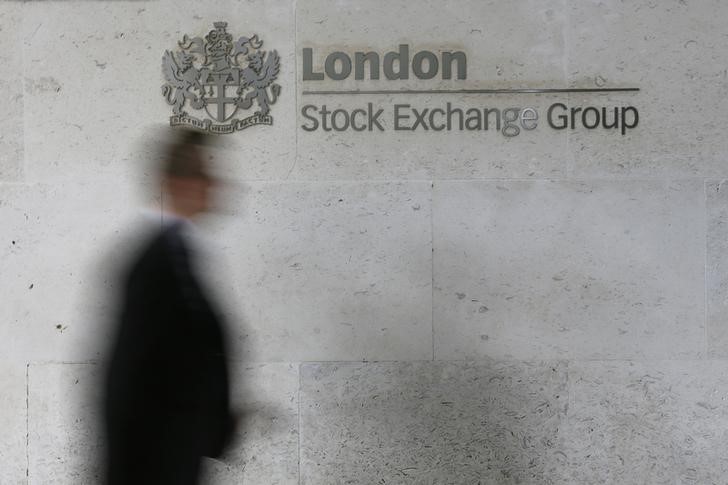* Euro stocks flat, MSCI world sees 3rd weekly fall in last 4
* Dollar higher vs majors, DXY up 1 percent for the week
* Seventh weekly rise in U.S. yields in last eight
* Gold heading for biggest weekly drop since December
* Russia waits on S&P investment grade rating decision
By Marc Jones
LONDON, Feb 23 (Reuters) - A stronger dollar and slightly higher global borrowing costs kept world shares subdued on Friday and left gold limping toward its worst week since December.
Europe's main London, Frankfurt and Paris markets 0#.INDEXE barely budged in early moves, keeping MSCI's 47- country world index .MIWD00000PUS just in the black on the day but facing its third red week in the last four.
Modest gains for the dollar .DXY meant the euro EUR= was set to post its second biggest weekly loss in nearly four months /FRX , as caution over the Italian election gave bond markets there their toughest week of 2018. GVD/EUR
Polls point to a hung parliament in Italy, where no one party or coalition has an outright majority to form a government, and analysts expect a short-term volatility that could weigh on traditionally sensitive euro zone markets.
Italy's 10-year bond yield was up 1 bps at 2.09 percent IT10YT=TWEB . It has risen about 10 basis points this week.
"Some long-forgotten patterns return to euro bond markets with Bunds rallying while Italy sells off," said Commerzbank (DE:CBKG) rates strategist Christoph Rieger.
He noted comments from European Commission President Jean-Claude Juncker this week, who was reported to have warned about Italian election risks.
Broader global cross-asset issues remained much the same as they have during a choppy few weeks. How far and fast U.S. interest rates can rise and what would it mean for global borrowing costs, risk appetite and business confidence.
That caution is reverberating in the bond markets with U.S. yields rising by more than 50 basis points since early December, more than the 38 basis points for German government debt.
Benchmark Treasury 10-year note yields US10YT=RR rose to a four-year high of 2.957 percent on Wednesday though they were a shade down at 2.904 percent on Friday.
The backsliding also stalled the dollar's overnight gains in Asia. It was virtually treading water against most major currencies by 0930 GMT, buying 106.8 yen JPY= and at $1.2325 EUR=EBS and $1.3965 GBP=D4 against the euro and pound.
It was still up more than 1 percent for the week and headed for its third gain in the last four weeks.
"We think the Fed could well put U.S. (interest) rates up four times this year but even then it only takes U.S. rates to 2.5 by the end of the year," said JPMorgan (NYSE:JPM) Asset Management global strategist Mike Bell. "So the question is would they continue at that pace in 2019?"
One of the Fed's chief doves, St Louis Fed President James Bullard, tried to tamp down expectations of four rate hikes on Thursday, saying policymakers needed to be careful not to slow the economy. SO PRECIOUS
Russian markets were readying for a big day with S&P Global due to review Moscow's credit rating. is just one step away from returning Russia to the investment grade bracket that it ejected it from after the 2014-2015 slump in oil prices and Ukraine crisis. Its restatement would also see Russian foreign currency bonds return to some widely-tracked bond indices.
In Asian trading overnight, MSCI's broadest index of Asia-Pacific shares outside Japan .MIAPJ0000PUS climbed 0.9 percent on Friday to add to the previous week's 3.9 percent gain.
It is still down more than 4 percent in February so far, however, after global equity markets were mauled at the start of the month by worries that inflation was picking up.
Japan's Nikkei .N225 rose 0.7 percent, though China's SSE (LON:SSE) Composite index .SSEC and the blue-chip CSI300 .CSI300 both pared their early gains after the government seized control of acquisitive financial conglomerate Anbang Insurance.
It was seen as a dramatic move that underscores Beijing's intent to crackdown on financial risk. dollar's strength meant it remained a tough environment for commodities which are priced in the U.S. currency.
U.S. West Texas Intermediate (WTI) crude futures CLc1 were at $62.74 a barrel, down 3 cents from their last settlement, while Brent crude futures LCOc1 were down 2 cents at $66.37 a barrel.
There were concerns about high U.S. crude export levels which outweighed an unexpected drop in oil inventories in the country which is also the world's biggest fuel consumer.
Industrial metals such as copper eased as they headed for a small weekly drop and as trading slowly picked up again after Chinese markets had been shut following the Lunar New Year holiday.
Gold remained the stand-out mover though and looking increasingly less precious.
Its spot market price XAU= was down 0.2 percent at $1,328, heading for a fifth session of falls in six. It has shed 1.6 percent this week, its biggest drop since early December.
"We remain somewhat cautious on gold over the short term given that we think the dollar rally is still not over, especially in the light of U.S. Treasury yields remaining elevated," said INTL FCStone analyst Edward Meir.
<^^^^^^^^^^^^^^^^^^^^^^^^^^^^^^^^^^^^^^^^^^^^^^^^^^^^^^^^^^^ MSCI and Nikkei chart
http://reut.rs/2sSBRiD MSCI global equities index through the year
http://reut.rs/2CDKMb6
^^^^^^^^^^^^^^^^^^^^^^^^^^^^^^^^^^^^^^^^^^^^^^^^^^^^^^^^^^^>
